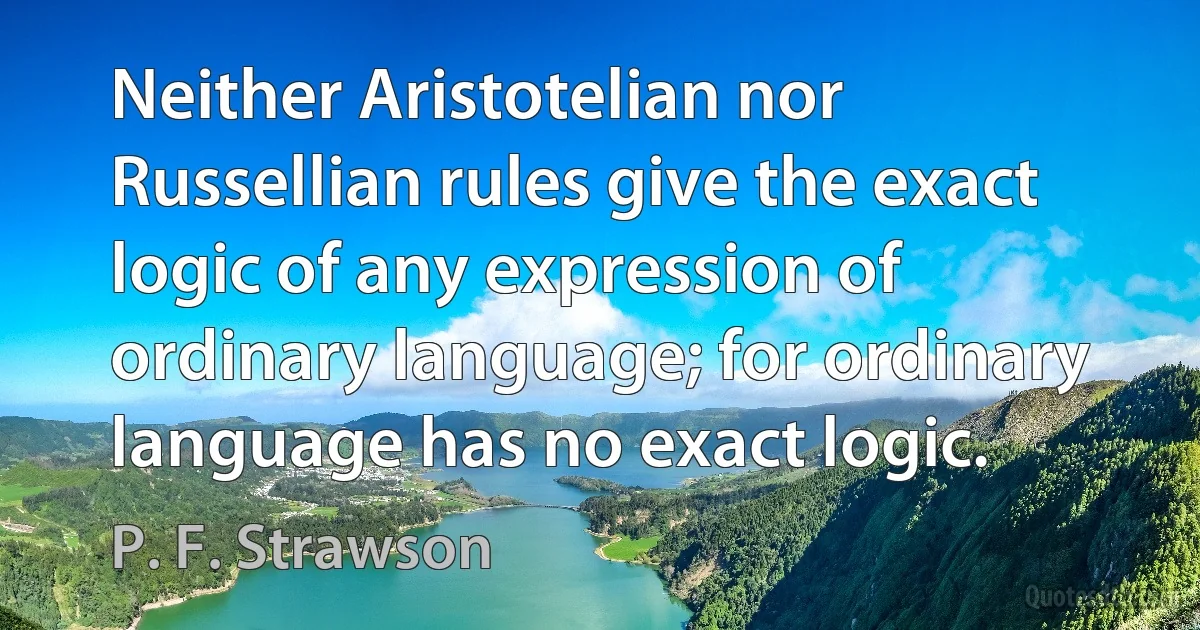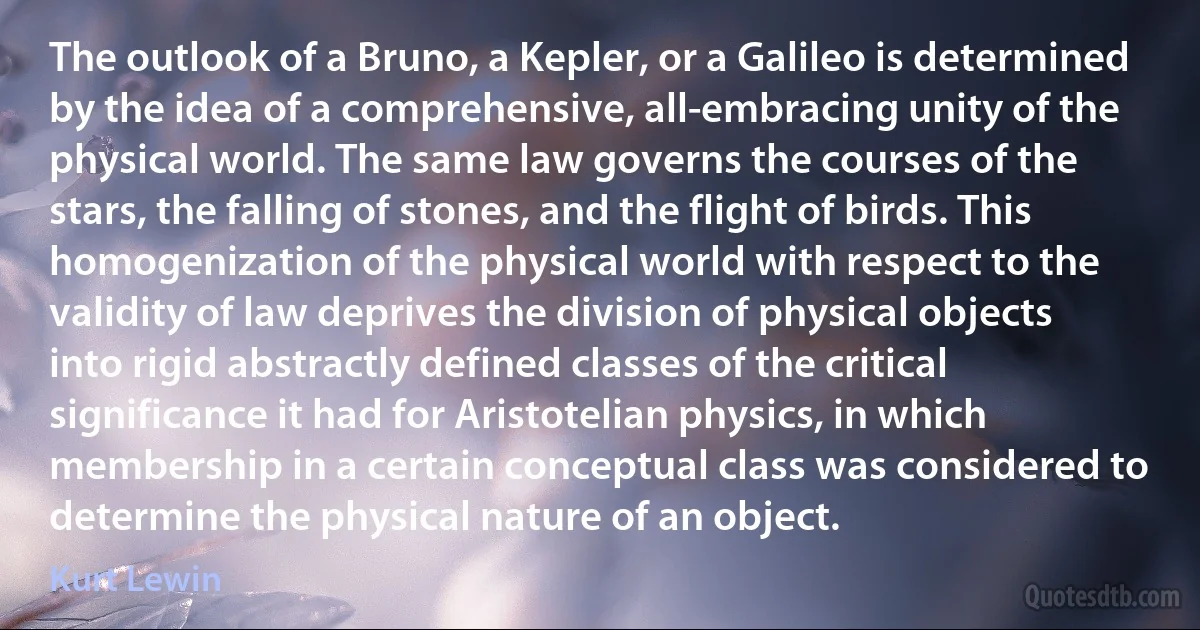Aristotelian Quotes
I dare truly and boldly say, that one years exercise therein to ingenious spirits, under able Masters, will produce more real and true fruit, than the studying Aristotelian Philosophy hath brought forth in many centuries. O that the Schools therefore would leave their idle, and fruitless speculations, and not be too proud to put their hands to the coals and furnace, where they might find ocular experiments to confute their fopperies, and produce effects that would be beneficial to all posterities.

John Webster
The Roman Catholic doctrine of transubstantiation... claims... the "Whole substance" of the wine is converted into the blood of Christ,; the appearance of wine that remains is "merely accidental", "inhering in no substance". Transubstantiation is colloquially taught as meaning that the wine "literally" turns into the blood of Christ. Whether in its obfuscatory Aristotelian or its franker colloquial form, the claim of transubstantiation can be made only if we do serious violence to the normal meanings of words like 'substance' and 'literally'.

Richard Dawkins
Time-travel has a uniquely intimate, and seductively morbid, relationship to both fiction and history, because it scrambles the very principle of narrative order in profundity. If Western media authorities assumed the same role of cultural custodianship that has been traditional among their Chinese peers, they too might have been compelled to denounce a genre that flagrantly subverted the foundational principle of Aristotelian poetics: that any story worthy of veneration should have a beginning, a middle, and an end. If time-travel can occur, it seems (at least initially) that order is an illusion, so that fiction and reality switch places.

Nick Land
The attitude of Aristotelian physics toward lawfulness takes a new direction. So long as lawfulness remained limited to such processes as occurred repeatedly in the same way, it is evident, not only that the young physics still lacked the courage to extend the principle to all physical phenomena, but also that the concept of lawfulness still had a fundamentally historic, a temporally particular, significance. Stress was laid not upon the "general validity” which modem physics understands by lawfulness, but upon the events in the historically given world which displayed the required stability. The highest degree of lawfulness, beyond mere frequency, was characterized by the idea of the always eternal.

Kurt Lewin
Coleridge observes that all men are born Aristotelians or Platonists. The latter feel that classes, orders, and genres are realities; the former, that they are generalizations. For the latter, language is nothing but an approximative set of symbols; for the former, it is the map of the universe. The Platonist knows that the universe is somehow a cosmos, an order; that order, for the Aristotelian, can be an error or a fiction of our partial knowledge. Across the latitudes and the epochs, the two immortal antagonists change their name and language: one is Parmenides, Plato, Spinoza, Kant, Francis Bradley; the other, Heraclitus, Aristotle, Locke, Hume, William James.

Jorge Luis Borges
By contrast, Galileo, the other legendary scientific figure of the era, not only published the most compelling critique of Aristotelian scholasticism in his Dialogues on the Two Chief World Systems, but in the process turned the issue of the epistemic authority of theology versus the epistemic authority of empirical science into a hallmark of modern times. Although Newton clearly sympathized with Galileo, he wrote virtually nothing critical of the Aristotelian tradition in philosophy, and the immense effort he devoted to theology was aimed not at challenging its epistemic authority, but largely at putting it on a firmer footing. Newton made no direct contributions to philosophy of a similar magnitude. Indeed, from his extant writings alone Newton has more claim to being a major theologian than a major philosopher.

I. Bernard Cohen
When mons. Descartes's philosophical Romance, by the Elegance of its Style and the plausible Accounts of natural Phænomena, had overthrown the Aristotelian Physics, the World received but little Advantage by the Change: For instead of a few Pedants, who, most of them, being conscious of their Ignorance, concealed it with hard Words and pompous Terms; a new Set of Philosophers started up, whose lazy Disposition easily fell in with a Philosophy, that required no Mathematicks to understand it, and who taking a few Principles for granted, without examining their Reality or Consistence with each other, fancied they could solve all Appearances mechanically by Matter and Motion; and, in their smattering Way, pretended to demonstrate such things, as perhaps Cartesius himself never believed; his Philosophy (if he bad been in earnest) being unable to stand the test of the Geometry which he was Master of.

John Theophilus Desaguliers
To make psychology into experimental epistemology is to attempt to understand the embodiment of mind. Here we are confronted by what seem to be three questions, although they may ultimately be only one. The three exist as categorically disperate desiderata.
The first is at the logical level: We lack an adequate, appropriate calculus for triadic relations.
The second is the psychological level: We do not know how we generate hypotheses that are natural and simple.
The third is that the physiological level: we have no circuit theory for the reticular formation that marshals our abductions.
Logically, the problem is far from simple. To be exact, no proposed theory of relations yields a calculus to handle our problem. When I was growing up, only the Aristotelian logic of classes was ever taught, and that badly. The Organon itself contains only a clumsy description of the apagoge - perhaps from the notes of some students who have not understand his master...

Warren S. McCulloch
The young people who now proposed to devote themselves to intellectual studies no longer took the term to mean attending a university and taking a nibble of this or that from the dainties offered by celebrated and loquacious professors who without authority offered them the crumbs of what had once been higher education. Now they had to study just as stringently and methodically as the engineers and technicians of the past, if not more so. They had a steep path to climb, had to purify and strengthen their minds by dint of mathematics and scholastic exercises in Aristotelian philosophy. Moreover, they had to learn to renounce all those benefits which previous generations of scholars had considered worth striving for: rapid and easy money-making, celebrity and public honors, the homage of the newspapers, marriages with daughters of bankers and industrialists, a pampered and luxurious style of life.

Hermann Hesse
The relationship between science and the humanities is two-way. Science changes our view of the world and our place in it. In the other direction, the humanities provide the store of ideas and images and language available to us in understanding the world. The exploding star of A.D. 1054, the Crab Nebula, was sighted and documented by the Chinese, but nowhere mentioned in the West, where the Aristotelian notion of the immortality of stars still held sway. We often do not see what we do not expect to see.

Alan Lightman
It is true that the masses have always been led in one manner or another, and it could be said that their part in history consists primarily in allowing themselves to be led, since they represent a merely passive element, a "matter” in the Aristotelian sense of the word. But, to lead them today, it is sufficient to dispose of purely material means, ... and this shows clearly to what depths our age has sunk. At the same time the masses are made to believe that they are not being led, but that they are acting spontaneously and governing themselves, and the fact that they believe this is a sign from which the extent of their stupidity may be inferred.

René Guénon
Now they had to study just as stringently and methodically as the engineers and technicians of the past, if not more so. They had a steep path to climb, had to purify and strengthen their minds by dint of mathematics and scholastic exercises in Aristotelian philosophy. Moreover, they had to learn to renounce all those benefits which previous generations of scholars had considered worth striving for: rapid and easy money-making, celebrity and public honors, the homage of the newspapers, marriages with daughters of bankers and industrialists, a pampered and luxurious style of life.

Hermann Hesse
Copernicus had taken one course in treating the earth as virtually a celestial body in the Aristotelian sense-a perfect sphere governed by the laws which operated in the higher reaches of the skies. Galileo complemented this by taking now the opposite course-rather treating the heavenly bodies as terrestrial ones, regarding the planets as subject to the very laws which applied to balls sliding down inclined planes. There was something in all this which tended to the reduction of the whole universe to uniform physical laws, and it is clear that the world was coming to be more ready to admit such a view.

Galileo Galilei
...But no matter how enamoured one may be with Postmodernist instability of meanings and signification slippage, absolutely nothing can make spinozisme as employed in Diderot's Promenade and the Encyclopédie, or in High Enlightenment literature, compatible with Revelation, divine providence, religious authority, theism, mysticism, fideism, eclecticism, moral relativism, Aristotelian substances, Platonic ideals, Prisca theologia (natural religion), Cartesian dualism, Lockean dualism based on supra rationem, double truth, fixity of species, Epicurean swerves, La Mettrie's materialism, or skepticism. ‘Spinozists' a term already in very wide use, in Britain, Germany, France, and Italy, as well as Holland well before 1700, and ‘spinozisme' as used in eighteenth-century France, can never mean, or ever be blended with, any of these trends. It may not always be a rigorous philosophical-theological category.

Baruch Spinoza



